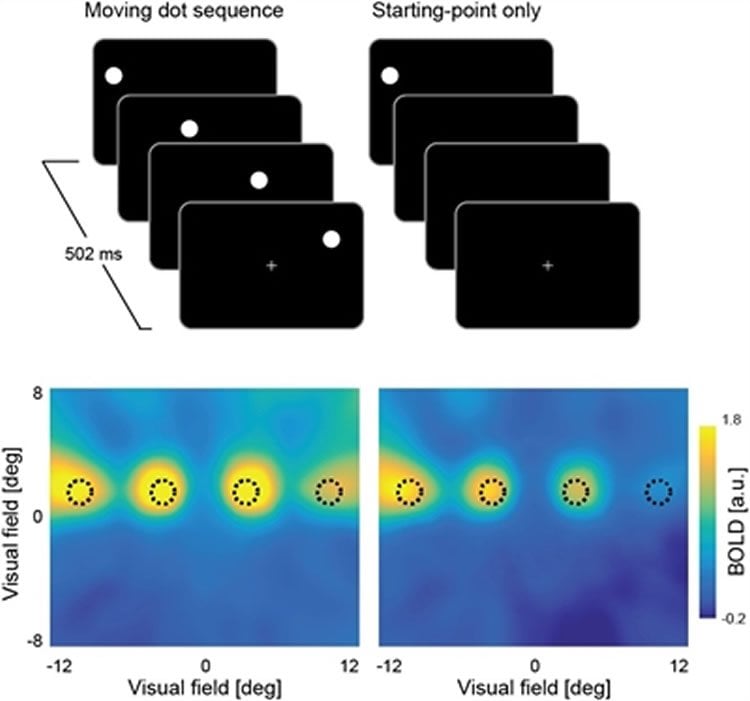Summary: The visual cortex is involved in predicting future events, a new study reports.
Source: Radboud University.
For a long time, researchers thought of the visual cortex as a brain area that determines what you perceive based on information coming from the eyes. Neuroscientists from Radboud University now show that the area is also involved in the prediction of future events. Nature Communications publishes the results on May 23.
Imagine that you are standing on the sidewalk, ready to cross the street. A car approaches and you need to decide whether to wait, or to cross the street before the car passes by. Did you ever wonder how you predict the future trajectory of the car? An experiment by Matthias Ekman and fellow researchers from Radboud University’s Donders Institute shows that the primary visual cortex, the main visual area of our brain, is not only involved in perceiving the car, but also in predicting its future locations.
White dots
The Radboud researchers designed an experiment that mimics this kind of situation. Instead of a car, study participants were shown a white dot moving quickly from the left to the right side of the screen, while lying in an fMRI scanner. The brain activity pattern in their visual cortex proved remarkably similar to the visual dot stimulus that was shown on the screen.
The crucial part of the experiment began after participants had watched the moving dot sequence for a few minutes. Now, occasionally, only the first dot on the left side of the screen was shown. Interestingly, the visual cortex’s activity pattern represented not only the starting point of the dot sequence – the one that was shown on screen – but also the remaining dots of the sequence. Ekman: “Our results show that we form expectations about upcoming events, and that the visual cortex can complete a sequence from only partial input.”
Automatic process
The predictive power of the visual cortex is also apparent from the results of one study condition in which participants were asked to focus on a changing letter in the background, completely ignoring the moving dots – see this video for an illustration of the task. Surprisingly, the same pattern of activity as before was measured in the visual cortex. “Your visual cortex predicts these events, even when your attention is elsewhere” according to Ekman. “The fact that the event prediction is independent from the attentional state, suggests that it reflects an automatic process.”

Of course, the MRI experiment is simplified compared to real life. But according to Ekman, the results can still tell us about how we anticipate future events in the ever changing world. “Our visual cortex might constantly predict events happening all around us on a daily basis: the rotating arms of a windmill, or how to catch the ball that is moving towards us.” In a follow-up study, the researchers examine which brain areas collaborate with the visual cortex to anticipate upcoming events. “We expect that the hippocampus – a brain area linked to memory – plays an important role in this process.”
Source: Radboud University
Image Source: NeuroscienceNews.com image is credited to the researchers.
Original Research: Full open access research for “Time-compressed preplay of anticipated events in human primary visual cortex” by Matthias Ekman, Peter Kok & Floris P. de Lange in Nature Communications. Published online May 23 2017 doi:10.1038/ncomms15276
[cbtabs][cbtab title=”MLA”]Radboud University “Visual Brain Predicts Future Events Based on Past Experiences.” NeuroscienceNews. NeuroscienceNews, 30 May 2017.
<https://neurosciencenews.com/vision-event-experience-6797/>.[/cbtab][cbtab title=”APA”]Radboud University (2017, May 30). Visual Brain Predicts Future Events Based on Past Experiences. NeuroscienceNew. Retrieved May 30, 2017 from https://neurosciencenews.com/vision-event-experience-6797/[/cbtab][cbtab title=”Chicago”]Radboud University “Visual Brain Predicts Future Events Based on Past Experiences.” https://neurosciencenews.com/vision-event-experience-6797/ (accessed May 30, 2017).[/cbtab][/cbtabs]
Abstract
Time-compressed preplay of anticipated events in human primary visual cortex
Perception is guided by the anticipation of future events. It has been hypothesized that this process may be implemented by pattern completion in early visual cortex, in which a stimulus sequence is recreated after only a subset of the visual input is provided. Here we test this hypothesis using ultra-fast functional magnetic resonance imaging to measure BOLD activity at precisely defined receptive field locations in visual cortex (V1) of human volunteers. We find that after familiarizing subjects with a spatial sequence, flashing only the starting point of the sequence triggers an activity wave in V1 that resembles the full stimulus sequence. This preplay activity is temporally compressed compared to the actual stimulus sequence and remains present even when attention is diverted from the stimulus sequence. Preplay might therefore constitute an automatic prediction mechanism for temporal sequences in V1.
“Time-compressed preplay of anticipated events in human primary visual cortex” by Matthias Ekman, Peter Kok & Floris P. de Lange in Nature Communications. Published online May 23 2017 doi:10.1038/ncomms15276






